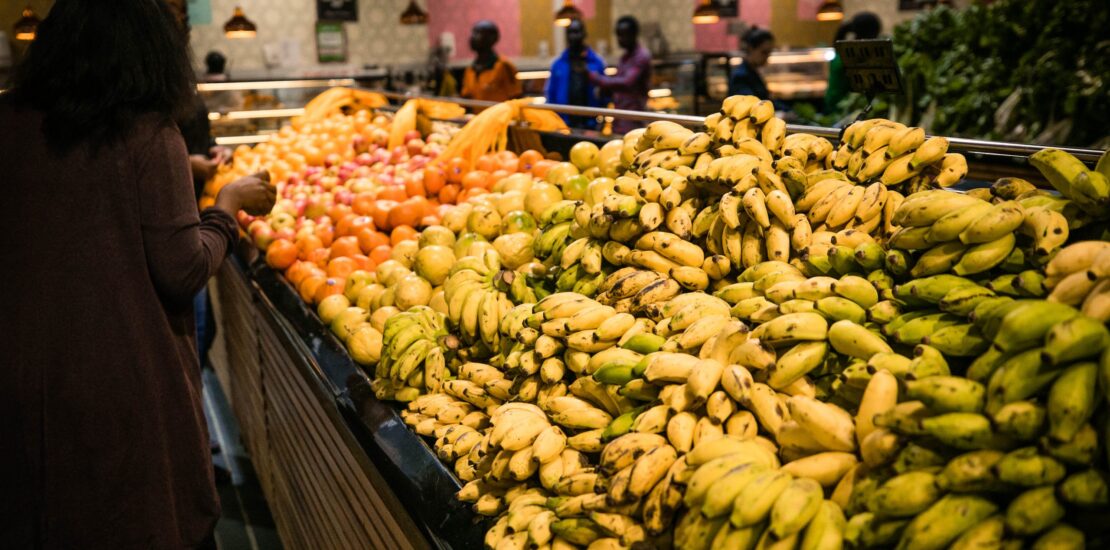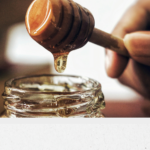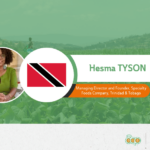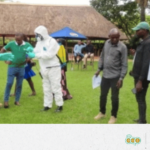News digest: Agri-food markets and production
- 31/05/2021
- Posted by: Gaetan Dermien
- Category: Africa, Angola, Avocados, Bananas, Belize, Burkina Faso, Cameroon, Caribbean, Citrus fruits, France, Germany, Ginger, Jamaica, Kenya, Malawi, Mangoes, Netherlands, News, Pacific, Peaches, South Africa, Spain, Sweet potatoes, Tanzania, Zimbabwe

GLOBAL
GlobalG.A.P. launches consumer label for fruit and vegetables
GlobalG.A.P. has unveiled its new consumer label for fruit and vegetables, GGN Certified Agriculture, to help foster trust between sustainable brands and consumers. GLOBALG.A.P. introduced the GGN label 5 years ago, firstly for aquaculture products, followed by floriculture products in 2017. Now fruit and vegetables are also included. All products with the GGN label come from a farm whose production process has been independently certified according to international GLOBALG.A.P. standards or one of the standards recognised by GLOBALG.A.P. as equivalent. These standards are holistic in nature and cover food safety, sustainability, environmental protection, animal welfare, workers’ health and safety, and supply chain transparency. The label provides transparency through unique 13-digit identification numbers that are linked to supply chain actors with GLOBALG.A.P. certification. These GLOBALG.A.P. Numbers (GGNs) correspond with profiles on the GGN label portal (www.ggn.org), allowing consumers to find the roots of their product. 576 farm profiles are already online. The label can be used by fruit and vegetable producers with an Integrated Farm Assurance certificate, a fully compliant Grasp assessment, a certificate for the whole chain and proof of participation in GlobalG.A.P.’s residue monitoring system.
View the New GGN Label Launch Event, held on 27 April, in English and Spanish.
Source: GlobalG.A.P.; Eurofruit, 27 April
Global overview: Mangoes
Fresh Plaza’s overview of the mango market shows a varied picture as many importers transition from one origin to another. Some markets such as the Netherlands and Belgium are struggling with low market prices, while Germany experiences high prices.
The last mangoes have left Côte d’Ivoire for the Netherlands, with rain ending shipments prematurely. This means, among other things, more unstable fruit in terms of ripening, as a result of which there is too much ripe fruit on the market. Prices on the free market have therefore collapsed by 40%. Keitt mangoes from the Dominican Republic, and Keitt and Palmer from Brazil, have also continued reasonably well with good quality mangoes.
In Belgium, the Peruvian mango season is over and the Ivorian season is in full swing. Both countries had a lot of supply of large sizes (6 and 7). But not all retailers buy large sizes, which put prices under even more pressure. After a significant decline, prices are currently somewhat stable again. The Ivorian season runs until the end of May/beginning of June, and will be followed by the West African countries.
The mango market in Germany had a difficult seasonal transition from Peru to Côte d’Ivoire. The last Peruvian volumes were traded at the end of April, but Ivorian merchandise was initially available in limited volumes. At the moment there is still too little supply on various wholesale markets, so prices are on the high side. At the same time, the demand for exotics in the wholesale trade has been at a relatively low level for months due to the closure of the catering industry. Now that the first easing seems to be on the way, it is suspected this could change in the short term.
See the full article for information on other EU importing countries and UK, and on global exporters.
Source: Fresh Plaza, 14 May
Fruit Logistica supports World of Fresh Ideas
Following the cancellation of this year’s planned Special Edition, Fruit Logistica instead supported World of Fresh Ideas, a two-day online event organised by its cooperation partner Fruitnet on 26-27 May. The digital event included presentations based on the fourth edition of the European Statistics Handbook, which highlights the impact of the coronavirus pandemic on the fruit and vegetable market, changed consumer behaviour, effects on trade with UK post-Brexit, and how the weather has affected food supply.
The recently published Handbook can be downloaded from the Fruit Logistica website at https://www.fruitlogistica.com/en/about/european-statistics-handbook/.
Source: Fruitnet, 13 May
AFRICA
FAO: “Fall Armyworm Control in Action”
FAO’s latest newsletter reports that eight Geo-Zone coordination meetings for implementation of the Global Action on FAW control at country and farmer-field levels were held between February and April 2021. Eight demonstration countries and 53 pilot countries got on board, with no country left behind. FAW pilot countries were asked to establish a national task force, designate a focal point, and participate actively in all technical training and demonstration activities organised within their Geo-Zones. The eight demonstration countries include four in Africa: Burkina Faso, Cameroon, Kenya and Malawi. FAO has also produced a Guidance Note, “Addressing the impact of Covid-19 on the global action for fall armyworm control”.
Source: FAW Control in Action, April
First mangoes of the season for SIIM
On 20 April, the SIIM branch of the Omer-Decugis Group announced the launch of the West African mango campaign (from Burkina Faso, Côte d’Ivoire, Mali and Senegal), distributed under the brand DIBRA. The company said “The first ship Oriane of the MSC Mediterranean Shipping Company left yesterday and will arrive in week 16. Eighty tons of mangoes are also making their way by plane this weekend with our Air France KLM Martinair Cargo partner.” SIIM produces, imports, ripens and distributes tropical fruit and vegetables.
This video describes how MSC Cargo works with SIIM, a subsidiary of the Omer-Decugis Group, to overcome the logistical challenges of the brief but very intense peak mango season.
Source: Fresh Plaza, 20 April ; Fresh Plaza, 24 May
Burkina Faso: three-year plan for the ginger sector
In mid-April the Ministry of Agriculture, Hydro-Agricultural Development and Mechanisation approved a three-year development action plan (2021–23 / CFAF 2.654 billion, i.e. €4 million) to increase ginger production and modernise the sector. The plan aims at improving seeds, technical itineraries, conservation and processing. The main production areas are located in the South-West, Cascades and Hauts-Bassin regions, with an annual production of 5,000 t per year, while domestic demand is 50,000 t per year. The creation of three professional organisations and an inter-profession is also envisaged, which should facilitate access to finance.
Source: Commodafrica, 20 Avril
Kenya: False codling moth on roses
Floral Daily reports that false codling moth (FCM) is posing an increasing threat to the export of roses from Kenya to the Netherlands. FCM is still being detected on a regular basis despite the efforts of farmers, the Kenya Plant Health Inspectorate Service (KEPHIS), and other stakeholders including the Kenya Flower Council (KFC), Fresh Produce Exporters Association of Kenya (FPEAK) and Fresh Produce Consortium (FPC). The EU is now considering increasing the number of inspections. In March, KEPHIS held an online meeting with stakeholders that proposed various measures, including management at production sites and the introduction of more stringent measures on interceptions. Floral Daily notes that KFC, FPEAK and FPC, with support from COLEACP, are at the forefront of addressing the FCM issue. According to Clement Tulezi (CEO of KFC): “We are planning to train 20 farms which have had repeated interceptions using the joint FCM protocol over the next 3 months.” COLEACP is currently providing coaching support on FCM management to the flower companies through the exporters’ associations under the NExT Kenya programme.
Source: Floral Daily, 26 April
Kenya: Increasing avocado exports
Kenya exported 72,000 t of avocados in 2020 (59,000 t in 2019). Europe is one of Kenya’s major markets for avocados, with a small volume exported to China. To maintain the quality of avocados to prevent premature harvesting, Kenya restricts exports of avocados between November and January every year.
Source: Asia Fruit, 15 April
Uganda: Ministry of Agriculture intensifies Hass avocado research
The Ugandan Ministry of Agriculture has intensified research on the viability of Hass avocado farming in different parts of the country. Dr Hillary Agaba, Director for Research at the National Forestry Resources Research Institute, says that Hass avocado is believed to be a highly profitable crop that has attracted a constant surplus demand in the international market. Agaba claims that Uganda aims to produce 1 million avocado seedlings over the next 12 months, which will be given out to farmers at a subsidised fee. A 10-acre avocado model farm will act as a gene bank for some 11 avocado varieties. This will be inspected by agronomists to study potential pests and diseases.
Source: Fresh Plaza, 25 May
Tanzania: new perspectives for avocado industry
An estimated 39,000 tons of avocadoes are produced in Tanzania, and between 8,500 and 9,000 tons were exported in 2020. The Arusha Region of Tanzania has high potential for exports of avocados. Mid-May the first avocado cluster for farmers in the Northern zone regions was launched. Farmers will be assisted through training, input and seedlings supplies, and access to new processing technologies and markets.
Source: Fresh Plaza, 17 May
Cameroon: Post-Covid-19 Recovery Fund
Within the framework of the Special National Solidarity Fund for the fight against the coronavirus and its economic and social repercussions (CFAF 150 billion in 2021 / approx. €230 million), the Ministry of the Economy will implement the recovery fund for the benefit of the productive sector thanks to an allocation of CFAF 7 billion (approx. €11 million). This fund will be allocated to three schemes: support fund for very small enterprises and small businesses (CFAF 2 billion / approx. €3 million); support fund for start-ups and innovative enterprises (CFAF 1 billion / approx. €1.5 million); and guarantee fund for medium-sized enterprises (CFAF 4 billion / approx. €6 million).
Source: Investir au Cameroun, 20 April
Severe drought in southwestern Angola
There is a severe drought in the south-western provinces of Angola (Kwanza-Sul, Benguela, Huambo or Huila). This hasn’t happened for 40 years, and is unusual during the rainy season. This agricultural region feeds the country, and in the midst of the Covid-19 pandemic families of farmers and herders are leaving these areas for other parts of the country and even neighbouring Namibia. Crop and livestock losses are expected, prompting the World Food Programme to sound the alarm.
Source: RFI, 28 Mars
Malawi: Banana industry recovering after BBTV devastation
Malawi’s banana industry was devasted by Banana Bunchy Top Virus (BBTV) in 2016. 185,000 farming households saw their revenues seriously affected. In 2019, the Ministry of Agriculture put in a lot of effort to revamp the banana sector, in collaboration with a five-year programme funded by the European Union and FAO. Production is growing and farmers are starting to see success by following expert advice.
Source: Fresh Plaza, 19 April
Zimbabwe: Orange-fleshed sweet potato added to nation’s food basket
The Ministry of Lands, Agriculture, Fisheries, Water and Rural Resettlement has added orange-fleshed sweet potato to the nation’s food basket. This new variety will contribute to diversifying the food and nutrition system as well as improving income sources. Local farmers could benefit from the growing demand for this “super-food” on international markets.
Source: Fresh Plaza, 3 May
South Africa: avocado production up in 2021
Production of Hass and Pinkerton varieties is expected to be high and export volumes up (16 million cartons / 64,000 t in 2021 compared to 15 million / 60,000 t in 2020). Larger sizes are expected due to good rainfall. The South African Avocado Growers’ Association will have to overcome the challenge of container availability. The avocado orchard is between 14,000 and 15,000 ha, and about 800 ha are planted each year. Most of the volume is produced in the warmer regions of northern South Africa. Over half (58%) is grown in Limpopo province, followed by Mpumalanga (42%) and KwaZulu-Natal (14%). 4% of production is already in the southern provinces of the Western and Eastern Cape.
Source: Fruchthandel, 7 Avril
South Africa: Impacts of Covid-19 on citrus exports
A report in Fresh Plaza describes current uncertainties for South African citrus exports. These include Covid-19 restrictions on export destinations. “The restaurant trade is still not operating in many countries of the world. If you look at lemons it will obviously be affected, but the other huge problem is the lack of available containers. That has been a huge factor, as well as the cost of containers which has increased substantially with surcharges on containers, like an extra US$500 on a container to Europe and US$1,200 to Canada.” South African exporters are experiencing a double impact from the increase in dollar-based freight rates, and the strength of the Rand. Shipping disruptions have also caused a surge in paper pulp prices, pushing up packaging costs.
Source: Fresh Plaza, 21 May
CARIBBEAN
Jamaica: Ginger production revival
During the past 20 years ginger production has steadily declined in Jamaica due to the ginger rhizome rot disease. A joint research programme led by IAEA and FAO is supporting the development of new ginger varieties tolerant to prevaling diseases. Experts all over the world are working on breeding over two dozen different crops for improving ginger. High-quality ginger varieties should be obtained using nuclear techniques for the first time the. Higher yields and tolerances to pathogen are expected.
Source: Fresh Plaza, 12 May
Citrus task force in Belize
Citrus production in Belize has declined in recent years (2 million boxes in 2019–20 campaign compared to almost 8 million boxes in 2005). Minister of Agriculture, Food Security and Enterprise Jose Mai has nominated a high-level Citrus Working Group for a period of 8 weeks. The working group will prepare concrete recommendations in order to tackles challenges and give new perspectives to the citrus industry.
Source: Fresh Plaza, 20 April
South America: New papaya variety results in higher yield
East-West Seed Company, based in Guatemala, has introduced a new hybrid papaya variety, “Maradona”, to the market. So far, production in Mexico shows great potential. The variety was among the first set of test hybrids developed by East-West Seeds after it started its papaya breeding programme around the year 2000: it took eight years to develop the hybrids and another three years of testing and commercial seed production before the selected hybrids were introduced to the market. Maradona has started gaining popularity during the past three years due to its firmness and longer shelf life, disease tolerance against anthracnose and Papaya ringspot virus, and extended fruiting that allows higher yield.
Source: Fresh Plaza, 30 April
EUROPE
EC: Covid emergency measures for organics prolonged
The European Commission has published Implementing Regulation 2021/772 to prolong Covid-19 temporary measures for the rules on organic controls until 1 July 2021. This amends Implementing Regulation 2020/977, which allows Member States to apply temporary measures in relation to the control system on the production of organic products and certain procedures provided for in the Trade Control & Expert System (TRACES). According to the Commission, Member States are facing disruptions in the functioning of their control systems in the organic sector, which will persist in light of the ongoing Covid-19 crisis.
Source: European Commission, 10 May
EC fall armyworm emergency measures likely to stay in place
Although there has not yet been a formal decision, the EU Commission’s fall armyworm emergency measures are likely to stay in place after 30 June. Commission Implementing Decision (EU) 2018/638, as last amended by Decision 2019/1598, establishing emergency measures to prevent the introduction and spread within the Union of the harmful organism Spodoptera frugiperda, is due to expire on 30 June 2021.
Source: Eur-Lex, 26 September 2019
Europe: Low summer fruit production expected in 2021
During the medFEL webinar held end of May, the main European producer countries (France, Greece, Italy, Spain) presented the 2021 summer fruit production forecasts for peaches, flat peaches and nectarines. Due to the strong frost in April and hail in some regions (e.g. Spain), much of the growing area in Europe has been affected and total production is just under 1.9 million tonnes (15% less than in 2019; 36% less than the 2015–19 average). The French Ministry of Agricultre has published statistics showing a drastic fall in French cherry production in 2021, the worst level for 46 years: 14.000 t are expected.
Source: Fruchthandel, 26 May ; Fresh Plaza, 26 May ; Médiafel, 20 May
Organic markets in Germany, France, Italy
In 2019, Italian exports of organic food products (6% of total agri-food exports) increased on international markets, especially to France and Germany. The EU is the second largest area in the world for organically cultivated land and Italy, together with France, is ranked second in the EU. In the past five years, Germany has increased its organic cultivation by almost 50%, with a 4% increase in sales. In 2019, the consumption of organic products in France increased by more than €1.4 billion to €11.93 billion, an increase of +13.5% compared to 2018, with an increase in surface area of 13.4%.
Source: Fruchthandel, 25 May
Lidl strengthens its position in Fairtrade bananas
Lidl sold about 10,300 tonnes of organic Fairtrade bananas in 2020. Since January, the chain has taken a further step by testing conventionally grown Fairtrade-certified bananas from Colombia and Ghana in eastern France. In Alsace and Lorraine, organic and Fairtrade/Max Havelaar certified bananas already represented 11% of its volume. With this new conventional offer, the proportion of certified bananas now stands at 67%. Max Havelaar points out that the benefits for banana cooperatives have enabled projects to improve production (infrastructure, agricultural diversification, training) and community services (schooling, health, infrastructure). Lidl previously trialled selling only Fairtrade bananas in southern Germany and in Belgium, but had to revert to a broader offer.
Source: Linéaires, 17 May
France: Study on food waste
According to a YouGov study in April 2021 for the anti-waste app Too Good To Go, 60% of French people throw away fruit and vegetables, fruit is thrown away when part of the fruit has ripened or become mouldy (82%). The fruits and vegetables most thrown away by consumers are salads, bananas and carrots. Fruit and vegetable professionals who are members of networks were interviewed. The fight against waste is a high priority (79.31%). In 2020, 75.86% of professionals lost less than 5% of their turnover in terms of food value and 68.97% lost less than 5% of their stock. The Covid-19 crisis reduced losses by 48%.
Source: Médiafel, 12 May
Netherlands: World’s first avocado-packing robot
Dutch company Nature’s Pride has the first operational avocado packing robot in the world. This innovation, called the Speedpacker, packs avocados ergonomically and efficiently without making concessions to quality. The Speedpacker, developed in partnership with the machinery-maker Selo, has three feed streams and is capable of processing 240 avocados per minute. The camera technology detects the avocados for the grippers. In this way the grippers know exactly how to pick up the avocados and place them in the boxes.
Source: Fresh Plaza, 12 May
Netherlands: Eosta bringing the bees back
To mark World Bee Day, Dutch organic specialist Eosta is highlighting its efforts to boost biodiversity by creating a sea of native wildflowers around its headquarters in Waddinxveen, in order to attract wild bees, honey bees, bumblebees, butterflies and other pollinators. The initiative is a natural continuation of Eosta’s sustainability strategy. In 2012, the company distributed 400,000 bags of flower seeds, in cooperation with Bionext and the Dutch Bijenstichting (Foundation for Bees), as part of its ‘Bees love organic’ campaign. Eosta is an international distributor of fresh organic and fair fruits and vegetables, with a focus on overseas fruit and greenhouse crops; CEO Volkert Engelsman is a member of COLEACP’s Board of Directors.
Source: Fruitnet, 20 May
Spain: The world’s most sustainable avocado?
Spanish company Trops, working with AgriSmart data, has managed to produce Hass avocados with less than 350 litres of water per kg of fruit produced. This is a world record, as avocado production normally requires 600–700 litres of water per kg. Precision agriculture represents a great advance in the objective set by Trops to meet Sustainable Development Goal 6 and “guarantee the availability of water and sustainable management”. This tool will allow farmers to carry out sustainable water management, maintaining and even increasing the productivity of their farms.
Source: Fresh Plaza, 21 May





![EU and GB approval changes (January-March 2025) 9-FFM+-[ENG]](https://news.colead.link/wp-content/uploads/2024/06/9-FFM-ENG-150x150.jpg)